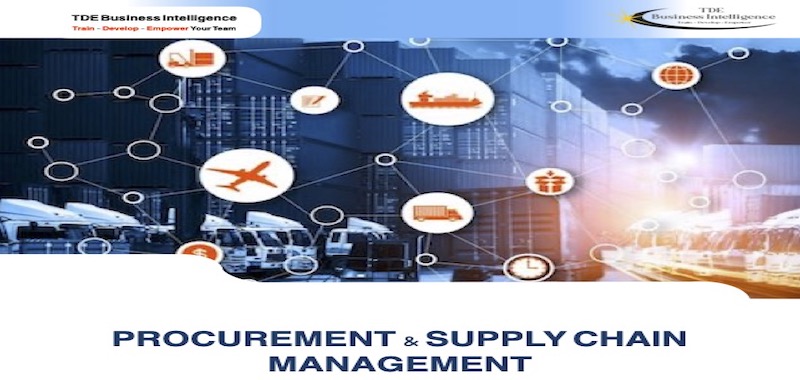
SCHEDULE
| Dates | Venue | Category |
| 4-15 September 2023 | Bangkok – Thailand | Supply Chain-Procurement |
INTRODUCTION
The development and implementation of carefully crafted strategies for the acquisition of all materials, goods, equipment and services has become a critical issue in all organizations wishing to reduce operating cost while improving quality and productivity.
This Procurement and Supply Chain Management Best Practices training course explores key concepts forming the basis of procurement and supply chain management and moves through leading edge issues that confront organizations today.
This training course is split into two modules:
PART I – Procurement Best Practices: 5 days (Session 1-5)
PART II – Logistics & Supply Chain Management – 5 days (Session 6-10)
BENEFITS OF ATTENDING
Upon the completion of this training, participants will be able to:
- Review the meaning of strategic procurement
- Be given examples of best practices in procurement and the supply chain
- Review how to obtain best pricing
- Be taught how to develop spend analysis
- Develop a functional and cross functional view of the supply chain
- See that better working with all of the supply chain players pays
- Consider Key Performance Indicators (KPI’s)
WHO SHOULD ATTEND?
- Contracts, Purchasing, and Procurement Personnel
- Project, Engineering, Operational, and Maintenance, Personnel who are involved in the planning, and execution of purchases and contracts
- Supply, Buying, Purchase, Logistics, Materials and Supply Chain Professionals
- All involved in the acquisition of materials, equipment, and services and who are in organizations whose leadership want high levels of competency in those involved in these activities
- Those who need to develop their limited understanding about Logistics and Supply Chain Management
- Those who are looking for business gains and benefits from managing their supply chains more effectively
COURSE OUTLINE
Session 1: Seeing Procurement as a Dynamic, Interactive System
- The System Approach vs. the Traditional Functional Approach
- What is the goal of Procurement?
- Developing the Strategic Procurement Plan
- An Overview of the Procurement Process
- Procurement as Part of the Supply Chain
Session 2: Developing the Strategic Procurement Decisions
- Make / Buy Decision
- Vertical Integration
- Alliances and Partnerships
- Inter-company Trade
- Reciprocity and Counter Trade
- Supplier Strategy
- The Coordination Strategy
- The Purchasing Organisation
Session 3: Implementing the Tactical Procurement Decisions
- Supplier Involvement
- Value Analysis
- Quality Assurance
- Supplier Selection
- Supplier Rating and Ranking
- Contract Management
- IT Systems and e-Procurement
- Policies and Procedures
- Staffing the Procurement Department
Session 4: Dealing with Operational Procurement Decisions
- Selecting the most Appropriate Ordering Process
- Addressing Quality Issues
- Follow-up
- Overdue Orders
- Expediting
- The Payment Process
- Reducing the Cost of Procurement: Small Value Purchase Orders
Session 5: Contingency Procurement Decisions
- The Different Contingency Situations
- Contingency Management
Procurement Performance Measurement
- Spend Analysis
- Total Cost of Ownership
- Supplier Performance Measurement
Session 6: Understanding Logistics and the Supply Chain
- Definitions of Logistics and Supply Chain Management
- History and the Development
- Understanding the Supply Chain Dynamics
- International and Global Logistics
- Supply Chain Operations Reference Models (SCOR)
- The Theory of Constraints (TOC)
Session 7: Transportation Economics
- The Role of Transportation in Logistics
- Management Key Decisions
- Types of Mode or Intermodal System
- International Commercial Terms in Transportation and the Liabilities
- Documentation in Transportation
- Hazardous Materials Transportation
Session 8: Performance, Risk and Warehouse Management
- Key Performance Indicators (KPI)
- Warehouse Management
- Role in the Supply Chain
- Flows
- Equipment Selection
- Supply Chain Risks
- Operational
- Inventory
- Exchange Rates
- Financial
- Disruption
- Security
Session 9: Procurement in Supply Chain
- The Difference between Procurement and Purchasing
- What is the role of Procurement and Purchasing?
- Support Operational Requirements
- Manage the Procurement Process and the Supply Base
- Develop Strong Relationships with Other Functional Groups
- Team Roles and Responsibilities
Session 9: Inventory Management
- Statistics in Inventory Management
- Financial in Inventory Management
- Selective Inventory Control Management
- Understanding Inventory Status
- Reducing Excess and Obsolete Inventory
- Improving the Organisation’s Logistics and Supply Chain
